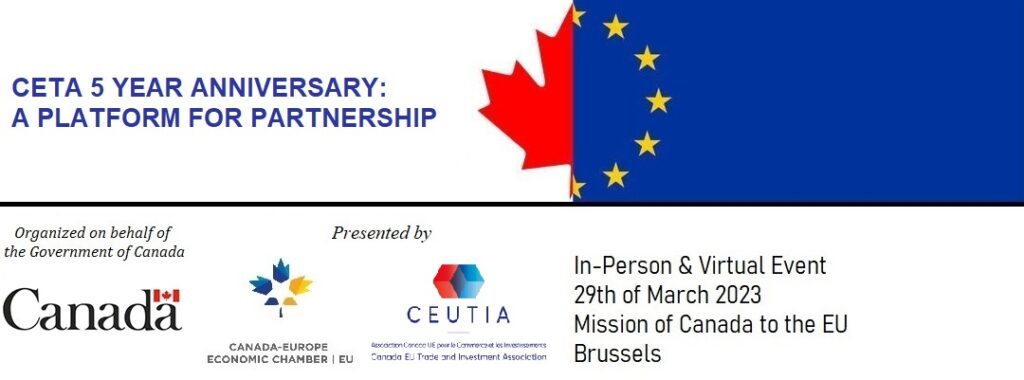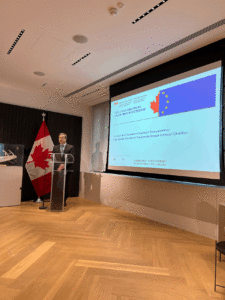CETA 5 Year Anniversary: A Platform for Partnership
Description
The European Union (EU) is one of the largest economies in the world and Canada’s second-largest trading partner. The Canada-European Union Comprehensive Economic and Trade Agreement (CETA) presents Canadian businesses with preferential access to and excellent opportunities for growth in the EU. September 21, 2022 marks the fifth anniversary of CETA’s provisional application. The Agreement will come into full effect when all EU Member States have completed the ratification process. Until then provisional application of CETA will continue and remain accessible to Canadian and EU business alike.
CETA explained
The Canada-European Union Comprehensive Economic and Trade Agreement (CETA) is a bilateral agreement between Canada and the EU. The agreement covers virtually all sectors and aspects of Canada-EU trade in order to eliminate or reduce barriers.
Why CETA matters
CETA represents the best in international trade agreements. CETA sets new standards for trade in goods and services, non-tariff barriers, investment, government procurement, and other areas like labour and the environment.
The EU is one of the largest economies in the world and Canada’s second-largest trading partner after the United States. It is also the world’s second-largest importing market for goods. The EU’s annual imports alone are worth more than Canada’s GDP. By opening new markets in the EU to Canadian exporters, CETA gives us a competitive advantage in the global market, which benefits all Canadians.
CETA is helping to create jobs, strengthen economic relations and boost Canada’s trade with the world’s second-largest market.
What CETA covers
CETA covers virtually all sectors and aspects of Canada-EU trade in order to eliminate or reduce barriers:
- Trade in goods: CETA eliminates tariffs and reduces barriers for virtually all sectors and aspects of Canada-EU trade. Prior to this agreement, only 25% of EU tariff lines on Canadian goods were duty-free. With CETA, 98% of EU tariff lines are now duty-free for Canadian goods.
- Rules of origin: Canadian exporters have clear and favourable rules that consider Canada’s supply chains to determine which products are considered originating and therefore eligible for preferential tariff treatment.
- Customs and trade facilitation: Canada and the EU are working to keep customs procedures simple, effective, clear and predictable. This reduces processing times at the border and makes it easier to move goods between countries.
- Regulatory cooperation and conformity assessment: CETA helps avoid unnecessary or discriminatory regulatory requirements. Canadian and EU regulators are collaborating to create regulatory measures that make it easier for Canadians to do business in the EU.
- Government procurement: Canadian companies can bid on opportunities at all levels of government in the EU, opening potential business estimated at $3.3 trillion annually.
- Trade in services and labour mobility: CETA provides Canadian service providers with more business opportunities in the EU and makes it easier for certain skilled professionals to work temporarily in the EU.
- Investment: Investment provisions in CETA are designed to give investors greater certainty, stability and protection for their investments and to provide access to an independent dispute resolution mechanism.
- Sustainable development, labour and the environment: CETA includes clear commitments to uphold Canada’s high standards and not to undermine them for commercial gain. Clear language confirms the right to regulate for all levels of government.
What it means for Canadian businesses
Here’s how CETA helps businesses across Canada:
- Competitiveness: Gives Canadian businesses preferential access to one of the largest economies in the world.
- Access to new clients: Allows Canadian businesses to supply goods and services to all levels of EU governments, including governments of EU member states. It also offers new opportunities with regional and local governments.
- Market transparency and stability: Sets requirements for product standards, investment, professional certification and other areas of activity. It also includes labour rights and environmental protection.
- Reduced barriers to trade: Makes it easier to move goods across borders and for business people to get to the right place at the right time to pursue opportunities.
S'inscrire
Fermé
Date(s)
Lieu
Mission of Canada to the EU - Brussels
Prix
Free
Detailed program
IN-PERSON & VIRTUAL EVENT
29 March, 2023
| 15.00 – 15.05 | Welcome & Introduction: Reuben East, Counsellor (Trade) Canada’s Mission to the European Union |
| 15.05 – 15.10 | Opening remarks by the Honorable Mary Ng, Minister of Small Business, Export Promotion and International Trade [live or pre-recorded message](to be confirmed) |
| 15.10 – 15.15 | Introduction of Canada’s Ambassador the European Union: Reuben East, Counsellor (Trade) Canada’s Mission to the European Union |
| 15.15 – 15.20 | Address of H.E. Dr. Ailish Campbell, Canada’s Ambassador to the European Union (to be confirmed) |
| 15.20 – 15.25 | Introduction of European Commission Representative: Sam Ayoub, President of the Canada-Europe Economic Chamber |
| 15.25 – 15.30 | Address of Matthias Jørgensen, Head of Unit for USA and Canada at DG Trade, European Commission |
| 15.30 – 15.35 | Introduction of Keynote Speaker: Mark Camilleri, President of the Canada EU Trade and Investment Association |
| 15.35 – 15.50 | Keynote Address of Jean Charest, former Premier of Québec & Partner at McCarthy Tétrault LLP |
| 15.50 – 16.10 | Networking break |
| 16.10 – 16.40 | Panel 1: CETA as a Platform for Partnership – An Industry Perspective (Panel discussion on how CETA can be leveraged with a focus on the next frontiers of regulatory cooperation followed by Q&A)Speakers:
Moderator: Melina Howard, Busines Developer Director, Fidefield – Luxembourg |
| 16.40 – 17.10 |
Panel 2: CETA as a Platform for Cooperation – a Business Perspective (Panel discussion on how CETA can play a role in establishing strategic and durable business links and new supply arrangements between the EU and Canada followed by Q&A)Speakers
Moderator: Rosie Birchard, Brussels Correspondent, Deutshe Welle |
| 17.10 – 17.15 | Closing remarks, Karen Kennedy Head of Trade, Canada’s Mission to the European Union |
| 17.15 – 18.30 | Cocktail Reception |
Date(s)
Lieu
Mission of Canada to the EU - Brussels
Prix
Free
S'inscrire
Fermé











